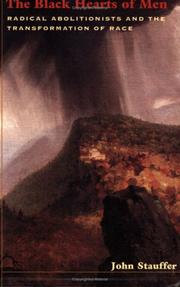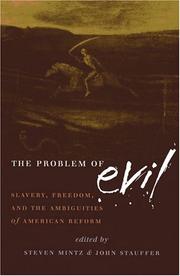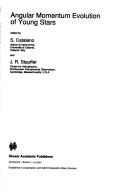| Listing 1 - 10 of 22 | << page >> |
Sort by
|

ISBN: 0674043960 9780674043961 9780674013674 0674013670 0674006453 9780674006454 0674267516 Year: 2022 Publisher: Cambridge, MA
Abstract | Keywords | Export | Availability | Bookmark
 Loading...
Loading...Choose an application
- Reference Manager
- EndNote
- RefWorks (Direct export to RefWorks)
At a time when slavery was spreading and America was steeped in racism, two white and two black men formed a unique alliance that sought to reconcile ideals of justice with the reality of slavery and oppression.
Abolitionists --- Antislavery movements --- Radicalism --- Racism --- Bias, Racial --- Race bias --- Race prejudice --- Racial bias --- Prejudices --- Anti-racism --- Critical race theory --- Race relations --- Extremism, Political --- Ideological extremism --- Political extremism --- Political science --- History --- Psychological aspects --- Smith, James McCune, --- Smith, Gerrit, --- Douglass, Frederick, --- Brown, John, --- Smith, James M'Cune, --- Smith, J. McCune --- Braun, Dzhon, --- Old Brown, --- Fighting Brown, --- Ossawatomie Brown, --- Bailey, Frederick Augustus Washington, --- Bailey, Freddie, --- Bailey, Fred, --- Baly, Frederick Augustus Washington, --- Nathan, --- Lover of all who love Jesus Christ, --- Your friend, --- United States --- ABŞ --- ABSh --- Ameerika Ühendriigid --- America (Republic) --- Amerika Birlăshmish Shtatlary --- Amerika Birlăşmi Ştatları --- Amerika Birlăşmiş Ştatları --- Amerika ka Kelenyalen Jamanaw --- Amerika Qūrama Shtattary --- Amerika Qŭshma Shtatlari --- Amerika Qushma Shtattary --- Amerika (Republic) --- Amerikai Egyesült Államok --- Amerikanʹ Veĭtʹsėndi︠a︡vks Shtattnė --- Amerikări Pĕrleshu̇llĕ Shtatsem --- Amerikas Forenede Stater --- Amerikayi Miatsʻyal Nahangner --- Ameriketako Estatu Batuak --- Amirika Carékat --- AQSh --- Ar. ha-B. --- Arhab --- Artsot ha-Berit --- Artzois Ha'bris --- Bí-kok --- Ē.P.A. --- EE.UU. --- Egyesült Államok --- ĒPA --- Estados Unidos --- Estados Unidos da América do Norte --- Estados Unidos de América --- Estaos Xuníos --- Estaos Xuníos d'América --- Estatos Unitos --- Estatos Unitos d'America --- Estats Units d'Amèrica --- Ètats-Unis d'Amèrica --- États-Unis d'Amérique --- Fareyniḳṭe Shṭaṭn --- Feriene Steaten --- Feriene Steaten fan Amearika --- Forente stater --- FS --- Hēnomenai Politeiai Amerikēs --- Hēnōmenes Politeies tēs Amerikēs --- Hiwsisayin Amerikayi Miatsʻeal Tērutʻiwnkʻ --- Istadus Unidus --- Jungtinės Amerikos valstybės --- Mei guo --- Mei-kuo --- Meiguo --- Mî-koet --- Miatsʻyal Nahangner --- Miguk --- Na Stàitean Aonaichte --- NSA --- S.U.A. --- SAD --- Saharat ʻAmērikā --- SASht --- Severo-Amerikanskie Shtaty --- Severo-Amerikanskie Soedinennye Shtaty --- Si︠e︡vero-Amerikanskīe Soedinennye Shtaty --- Sjedinjene Američke Države --- Soedinennye Shtaty Ameriki --- Soedinennye Shtaty Severnoĭ Ameriki --- Soedinennye Shtaty Si︠e︡vernoĭ Ameriki --- Spojené staty americké --- SShA --- Stadoù-Unanet Amerika --- Stáit Aontaithe Mheiriceá --- Stany Zjednoczone --- Stati Uniti --- Stati Uniti d'America --- Stâts Unîts --- Stâts Unîts di Americhe --- Steatyn Unnaneysit --- Steatyn Unnaneysit America --- SUA (Stati Uniti d'America) --- Sŭedineni amerikanski shtati --- Sŭedinenite shtati --- Tetã peteĩ reko Amérikagua --- U.S. --- U.S.A. --- United States of America --- Unol Daleithiau --- Unol Daleithiau America --- Unuiĝintaj Ŝtatoj de Ameriko --- US --- USA --- Usono --- Vaeinigte Staatn --- Vaeinigte Staatn vo Amerika --- Vereinigte Staaten --- Vereinigte Staaten von Amerika --- Verenigde State van Amerika --- Verenigde Staten --- VS --- VSA --- Wááshindoon Bikéyah Ałhidadiidzooígíí --- Wilāyāt al-Muttaḥidah --- Wilāyāt al-Muttaḥidah al-Amirīkīyah --- Wilāyāt al-Muttaḥidah al-Amrīkīyah --- Yhdysvallat --- Yunaeted Stet --- Yunaeted Stet blong Amerika --- ZDA --- Združene države Amerike --- Zʹi︠e︡dnani Derz︠h︡avy Ameryky --- Zjadnośone staty Ameriki --- Zluchanyi︠a︡ Shtaty Ameryki --- Zlucheni Derz︠h︡avy --- ZSA --- Η.Π.Α. --- Ηνωμένες Πολιτείες της Αμερικής --- Америка (Republic) --- Американь Вейтьсэндявкс Штаттнэ --- Америкӑри Пӗрлешӳллӗ Штатсем --- САЩ --- Съединените щати --- Злучаныя Штаты Амерыкі --- ولايات المتحدة --- ولايات المتّحدة الأمريكيّة --- ولايات المتحدة الامريكية --- 미국 --- Moral and ethical aspects. --- Spojené obce severoamerické --- États-Unis --- É.-U. --- ÉU

ISBN: 0446580090 9780446580090 Year: 2008 Publisher: New York : Twelve,
Abstract | Keywords | Export | Availability | Bookmark
 Loading...
Loading...Choose an application
- Reference Manager
- EndNote
- RefWorks (Direct export to RefWorks)
KORTE Inhoudsopgave : -- Meeting the president (August 10, 1863) -- Privileged slave and poor white trash -- Fugitive orator and frontier politician -- Radical abolitionist and Republican -- Abolitionist warrior and war president -- Friends.
Abolitionisme --- Abolitionists --- African American abolitionists --- Presidenten --- Verenigde Staten --- Biografieën. --- Verenigde Staten --- Biografieën. --- Douglass, Frederick, --- Lincoln, Abraham,
Book
ISBN: 0199339589 1299469795 0199837449 9780199837441 9780199837434 0199837430 9780199339587 9781299469792 Year: 2013 Publisher: New York Oxford University Press
Abstract | Keywords | Export | Availability | Bookmark
 Loading...
Loading...Choose an application
- Reference Manager
- EndNote
- RefWorks (Direct export to RefWorks)
It was sung at Ronald Reagan's funeral, and adopted with new lyrics by labor radicals. John Updike quoted it in the title of one of his novels, and George W. Bush had it performed at the memorial service in the National Cathedral for victims of September 11, 2001. Perhaps no other song has held such a profoundly significant--and contradictory--place in America's history and cultural memory than the ""The Battle Hymn of the Republic."" In this sweeping study, John Stauffer and Benjamin Soskis show how this Civil War tune has become an anthem for cause after radically different cause. The song o
Protest songs --- Music --- Social movements --- Movements, Social --- Social history --- Social psychology --- Art music --- Art music, Western --- Classical music --- Musical compositions --- Musical works --- Serious music --- Western art music --- Western music (Western countries) --- Political ballads and songs --- Songs --- Topical songs --- Radicalism --- History and criticism. --- Political aspects --- History. --- Battle hymn of the republic (Song) --- Glory! glory! hallelujah (Song) --- Glory hallelujah (Song) --- John Brown (Song) --- John Brown's baby has a cold upon his chest --- Say, brothers, will you meet us?
Book
ISBN: 0917678230 Year: 1988 Publisher: Westport (Conn.): Food and nutrition press
Abstract | Keywords | Export | Availability | Bookmark
 Loading...
Loading...Choose an application
- Reference Manager
- EndNote
- RefWorks (Direct export to RefWorks)

ISBN: 155849569X 9781558495692 Year: 2007 Publisher: Amherst Boston University of Massachusetts Press
Abstract | Keywords | Export | Availability | Bookmark
 Loading...
Loading...Choose an application
- Reference Manager
- EndNote
- RefWorks (Direct export to RefWorks)

ISBN: 079231316X 9401055874 9401135800 9780792313168 Year: 1991 Volume: 340 Publisher: Dordrecht Kluwer
Abstract | Keywords | Export | Availability | Bookmark
 Loading...
Loading...Choose an application
- Reference Manager
- EndNote
- RefWorks (Direct export to RefWorks)
Stars --- Early stars --- Angular momentum --- Congresses. --- Evolution --- 521.1 --- -Early stars --- -Stars --- -Sidereal system --- Galaxies --- Circumstellar matter --- Blue stars --- Early type stars --- High temperature stars --- Hot stars --- Moment of momentum --- Momentum, Angular --- Momentum (Mechanics) --- Celestial mechanics. General principles of dynamical astronomy --- Congresses --- -Congresses --- -Celestial mechanics. General principles of dynamical astronomy --- 521.1 Celestial mechanics. General principles of dynamical astronomy --- -521.1 Celestial mechanics. General principles of dynamical astronomy --- Sidereal system --- Evolution&delete& --- Early stars - Congresses. --- Stars - Evolution - Congresses. --- Angular momentum - Congresses. --- Early stars - Congresses --- Stars - Evolution - Congresses --- Angular momentum - Congresses
Book
ISBN: 0801463696 080146370X 9780801463709 9780801447907 0801447909 Year: 2013 Publisher: Ithaca, NY
Abstract | Keywords | Export | Availability | Bookmark
 Loading...
Loading...Choose an application
- Reference Manager
- EndNote
- RefWorks (Direct export to RefWorks)
Frederick Douglass, a runaway Maryland slave, was witness to and participant in some of the most important events in the history of the American Republic between the years of 1818 and 1895. Beginning his long public career in 1841 as an agent of the Massachusetts Anti-Slavery Society, Douglass subsequently edited four newspapers and championed many reform movements. An advocate of morality, economic accumulation, self-help, and equality, Douglass supported racial pride, constant agitation against racial discrimination, vocational education for blacks, and nonviolent passive resistance.He was the only man who played a prominent role at the 1848 meeting in Seneca Falls that formally launched the women's rights movement. He was a temperance advocate and opposed capital punishment, lynching, debt peonage, and the convict lease system. A staunch defender of the Liberty and Republican parties, Douglass held several political appointments, frequently corresponded with leading politicians, and advised Presidents Lincoln, Grant, Hayes, Garfield, and Harrison. He met with John Brown before his abortive raid on Harpers Ferry, helped to recruit African American troops during the Civil War, attended most national black conventions held between 1840 and 1895, and served as U.S. ambassador to Haiti. Frederick Douglass has left one of the most extensive bodies of significant and "able public statements of any figure in American history. In the Words of Frederick Douglass is a rich trove of "ations from Douglass. The editors have compiled nearly seven hundred "ations by Douglass that demonstrate the breadth and strength of his intellect as well as the eloquence with which he expressed his political and ethical principles.
African Americans --- Afro-Americans --- Black Americans --- Colored people (United States) --- Negroes --- Africans --- Ethnology --- Blacks --- Civil rights --- History --- Douglass, Frederick, --- Political and social views. --- Bailey, Frederick Augustus Washington, --- Bailey, Freddie, --- Bailey, Fred, --- Baly, Frederick Augustus Washington, --- Black people
Book
ISBN: 0300210566 9780300210569 9780300184624 030018462X Year: 2015 Publisher: New Haven
Abstract | Keywords | Export | Availability | Bookmark
 Loading...
Loading...Choose an application
- Reference Manager
- EndNote
- RefWorks (Direct export to RefWorks)
First published nearly a decade prior to the Civil War, The Heroic Slave is the only fictional work by abolitionist, orator, author, and social reformer Frederick Douglass, himself a former slave. It is inspired by the true story of Madison Washington, who, along with eighteen others, took control of the slave ship Creole in November 1841 and sailed it to Nassau in the British colony of the Bahamas, where they could live free. This new critical edition, ideal for classroom use, includes the full text of Douglass's fictional recounting of the most successful slave revolt in American history, as well as an interpretive introduction; excerpts from Douglass's correspondence, speeches, and editorials; short selections by other writers on the Creole rebellion; and recent criticism on the novella.
Slaves --- Slave insurrections --- Mutiny --- Insubordination --- Military offenses --- Naval offenses --- Slave rebellions --- Slave revolts --- Slavery --- Revolutions --- Enslaved persons --- Persons --- History --- Insurrections, etc. --- Washington, Madison --- Creole (Brig) --- Mutinies
Book
Year: 1964 Publisher: Minneapolis, Minnesota : Burgess,
Abstract | Keywords | Export | Availability | Bookmark
 Loading...
Loading...Choose an application
- Reference Manager
- EndNote
- RefWorks (Direct export to RefWorks)
Tissue metabolism. --- Manometers --- Tissus (Histologie) --- Manomètres --- Métabolisme
Book
ISBN: 0674064909 0674069307 9780674069305 9780674064904 9780674064447 0674064445 Year: 2012 Publisher: Cambridge, MA
Abstract | Keywords | Export | Availability | Bookmark
 Loading...
Loading...Choose an application
- Reference Manager
- EndNote
- RefWorks (Direct export to RefWorks)
The abolitionists of the mid-nineteenth century have long been painted in extremes--vilified as reckless zealots who provoked the catastrophic bloodletting of the Civil War, or praised as daring and courageous reformers who hastened the end of slavery. But Andrew Delbanco sees abolitionists in a different light, as the embodiment of a driving force in American history: the recurrent impulse of an adamant minority to rid the world of outrageous evil.Delbanco imparts to the reader a sense of what it meant to be a thoughtful citizen in nineteenth-century America, appalled by slavery yet aware of the fragility of the republic and the high cost of radical action. In this light, we can better understand why the fiery vision of the ";abolitionist imagination"; alarmed such contemporary witnesses as Herman Melville and Nathaniel Hawthorne even as they sympathized with the cause. The story of the abolitionists thus becomes both a stirring tale of moral fervor and a cautionary tale of ideological certitude. And it raises the question of when the demand for purifying action is cogent and honorable, and when it is fanatic and irresponsible. Delbanco's work is placed in conversation with responses from literary scholars and historians. These provocative essays bring the past into urgent dialogue with the present, dissecting the power and legacies of a determined movement to bring America's reality into conformity with American ideals.
| Listing 1 - 10 of 22 | << page >> |
Sort by
|

 Search
Search Feedback
Feedback About UniCat
About UniCat  Help
Help News
News